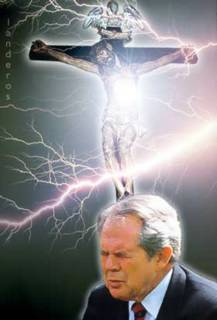For a good time now I have been fearful of whether the African face of AMiA was the real deal. Not that I had any particular reason for this suspicion, mind you. The folks that I have met over the past couple of years in Chicago and now in St. Louis have been of exceptional quality and integrity. They have manifested a deep concern for the catholicity of the Church and fidelity to the Apostolic Faith. Put simply, I feel very proud and humbled to know such people. The concern was the manner in which the Mission came into being in the first place. Episcopalians have permitted so much revisionism to flourish under their aegis that one is rightly suspicious of the sudden retreat toward orthodoxy when a gay bishop is ordained. After all, if you can embrace all the other terrors of modernity, what could occasion the sudden exclusion except a pernicious homophobia?
Of course, I have long given up this fear when it comes to the AMiA folk that I know personally, but the question has remained when it comes to the broader organization. I already know that St. Louis and Chicago are the catholic strongholds of AMiA where other places give greater latitude to the “happy-clappy,” church growth element of American evangelicalism. I could stomach that as long as the Liturgy of the Prayer Book remained intact, but the bigger question was whether the realpolitick that drives more banal evangelical church practices drives the Anglican Mission’s ecclesiological self-understanding as well. Put simply, are the bishops of the so-called Global South really bishops, or do they merely function as a wax nose giving ecclesiastical cover to otherwise disaffected, maverick evangelical conservatives?
Fortunately, the Global South bishops
are true bishops. Far from disconnected or ignorant of the specific cultural challenges in North America, they demonstrate a far subtler understanding of our situation than most of us are of there’s. Archbishop Datuk Yong Ping Chung of South East Asia addressed the gathered crowd in his opening night homily and felt no discomfort whatsoever in admonishing us as our bishop. Our Primate, the Most Rev. Emmanuel Kolini of Rwanda demonstrated his ease with being in charge by extending the Liturgy an extra half-hour while inviting the other seven visiting primates to address us individually. Turning to the American missionary bishops, Kolini then told us that he has “never regretted laying hands on” the Rt. Rev. Chuck Murphy and the Rt. Rev. John Rogers. Now, it’s pretty hard to get at the flavor of these actions, but they communicated to me a certain comfort with ecclesiastical authority – not lorded over those under their charge, but humbly expressed without self-consciousness.
The general African flavor of AMiA also plays out in the manner that the churches relate to one another. Far from being beholden to the money that comes from the richer Western churches, the Africans have declared themselves in broken or impaired communion with the Episcopal Church and the Anglican Church in Canada despite the financial cost. In AMiA, there is certainly a monetary benefit to Rwanda and other African provinces, but there is no hint of our playing the role of condescending benefactors. Rather, it is they who consider us impoverished for the poor state of the Church in the West. One Archbishop told us of his conversion at the age of eighteen because of the efforts of Western missionaries. To paraphrase his comments, Americans had brought the light of the Gospel to that which was formerly called the “Dark Continent,” but now that a great darkness has settled on us, those to whom our grandparents had brought enlightenment were bringing a little of that light back to us.
If it is to be believed that in the next millennium the center of gravity in Christendom will shift away from Europe and North America to regions south of the Equator, AMiA stands to be a leader organization in the United States. AMiA is already working on the question of how to more closely integrate the theological and clerical formation of priests on both continents. Africa stands to benefit from the great Western theological tradition and the West stands to benefit from the development and appropriation of distinctive African theologies.
There are some 76 million Anglicans worldwide and the numbers will increase principally in Africa. Archbishop Bernard Molango of Central Africa told a small number of us that he is confirming at least a hundred new converts annually in each of the parishes of his diocese. Other of the bishops gathered confirmed this general sense that God is working powerfully in Africa.
I have long been concerned about the real power of Reformed Presbyterianism to really go the distance in the new millennium. Its confessional tradition, liturgical minimalism, and general suspicion of symbol, ritual, tradition, and embodied spirituality seem only appealing to rich white-folk. The problem, however, is the seeming absence of an alternative. Now, I am the last guy to buy into a fad or a sales pitch and I am generally post-cynical, but this week was truly amazing and it has stoked both my enthusiasm and imagination for what shape my vocation may take in the future.



